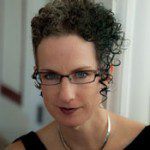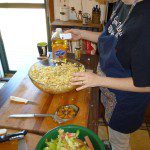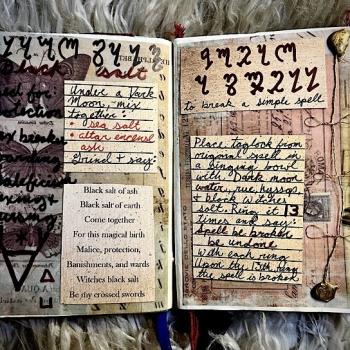A Pagan in Syria is dead, ripped apart by political and religious zeal, raped and tortured by intolerance.
Yesterday, I was speaking with priestess Crystal Blanton about how much of the interfaith work we do is easily overlooked. People think of interfaith work as Don Frew serving the United Religions Initiative; Patrick McCollum and Rachael Watcher traveling to India; Angie Buchanan, Phyllis Curott or Grove Harris working with the Parliament of Worlds Religions; Macha Nightmare helping the Marin Interfaith Council; or Andras Corban Arthen meeting with faith leaders in Mexico.
Interfaith work is all of these important things, and yet, it is so much more. David Salisbury working at the Human Rights Campaign is interfaith work. Joseph Nichter and Robert Russell talking with prison chaplains as they do their ministry behind bars is interfaith education. Courtney Weber showing up at Occupy Wall Street is interfaith work. All the social justice work I do is interfaith work. When I show up for phone calls with the Council on Foreign Relations and say I am a Pagan minister, that is interfaith work. Every person who attends a city council or PTA meeting as a Pagan, Wiccan, Heathen, or Druid is doing interfaith work.
Why is this important? Those of us who find it safe enough to do so must walk in the world as we are, who we are. We must talk to people of other religions and no religion about the love we hold for the earth, the reverence we hold for our Gods and the importance of pluralism. The more of us that do this, the greater a chance for understanding, globally. By living pluralism, we spread pluralism.
What does this have to do with Yana? Everything and nothing. Syrians are living between a rock and a hard place and there is little we can do about it. There is a murderous despot in charge, and those rebelling against him seem no better. People are scared for their lives. When people are frightened, fundamentalism rises as a way to try to impose sense and order on the world. Yana was a Pagan. She is now dead because her fundamentalist brother turned her in. We can’t save her. What we can do, together, is become a global voice speaking for justice. What we can do, together, is become a voice that says, “People of Pagan and polytheist religions are doing good work in the world. We are a force for peace and justice. We are sowing seeds of love and change.” We can do that work unflinchingly and unapologetically. When we stand hand in hand with people of other religions, we can say “blessed be” or “hail.” These are small things, but they add up. They send out ripples of awareness.
A friend once asked me why I attended the Parliament of the World’s Religions in Australia. He didn’t understand why interfaith work was useful. I replied that while I prefer to do my interfaith work under the guise of service, peace, and justice, things like the Parliament are important. Why? Because of the conversations in the halls. Because of shared meals. Because shaking hands and breaking bread with someone who has never met a Pagan changes the world. It is a small encounter. But those small encounters mean that someone might return to Saudi Arabia, or Syria or some other place and remember that they met someone whose religion was not theirs, and that person seemed upstanding, that person fed the hungry or planted trees. That person was not a force for evil, but for good.
And maybe, just maybe, that person would open her home to someone like Yana, and take her into hiding when she was in danger. And maybe, just maybe, years from now, the society itself would start to change enough that those in political or religious power would begin to listen to people who said, “My sister is Pagan. She is a good woman. Our world must include a place for others like her.” Perhaps these encounters would sow the ground for understanding instead of fear.
We don’t know the effect our actions will have on the world. With every honest encounter we risk having, we set some wheels in motion, we loosen a knot, or turn on a light. Someday, these actions just might save a life. We each have a choice to do interfaith work. Every single day.
When I heard the news of Yana’s death from Cara Schulz, I asked if there was anything we could do, as a community. I had donated money for blankets for Syrian refugees many months ago. Was there something like this she thought I might help organize? She quickly set up a page in Yana’s memory with Medecins Sans Frontieres. The money will go to supply doctors working to help those affected by the fighting in Syria. I pledged to donate, and to spread the word.
Will you stand with me and with Cara? Will you stand as Pagan, Wiccan, Heathen, Polytheist, non-Deist, or whatever name you choose? Will you take this small action – $5, $10, $50 – and honor Yana, who was brave enough to live as a Pagan in a place hostile to her very existence?
The living have a responsibility to the dead and to those who are yet to come. We are the bridge between space and time. What we choose to do, matters. Let’s do this thing, for Yana, for each other, for the world.
What is remembered lives.
 T. Thorn Coyle is a magic worker. An internationally respected teacher of the magical and esoteric arts, she is author of Make Magic of Your Life: Purpose, Passion, and the Power of Desire (March, 2013), as well as Kissing the Limitless, Evolutionary Witchcraft, and Crafting a Daily Practice. Host of Elemental Castings and the Fiat LVX! video series, she writes a popular weblog, Know Thyself, and has produced several CDs of sacred music. Often called a “Master Teacher” Thorn’s teaching and spiritual direction practices help people worldwide. Pagan, mystic, and activist, she is founder and head of Solar Cross Temple and Morningstar Mystery School and lives by the San Francisco Bay.
T. Thorn Coyle is a magic worker. An internationally respected teacher of the magical and esoteric arts, she is author of Make Magic of Your Life: Purpose, Passion, and the Power of Desire (March, 2013), as well as Kissing the Limitless, Evolutionary Witchcraft, and Crafting a Daily Practice. Host of Elemental Castings and the Fiat LVX! video series, she writes a popular weblog, Know Thyself, and has produced several CDs of sacred music. Often called a “Master Teacher” Thorn’s teaching and spiritual direction practices help people worldwide. Pagan, mystic, and activist, she is founder and head of Solar Cross Temple and Morningstar Mystery School and lives by the San Francisco Bay.

















